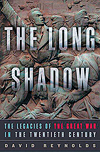
The Long Shadow: The Legacies of the Great War in the 20th Century, by David Reynolds, W.W. Norton & Co., New York, 2014, $32.50
The summer of 2014 marks the centenary of the beginning of World War I, among the most momentous conflicts in history, one whose effects persist to this day. Small wonder, then, Cambridge history professor David Reynolds has entitled his new study of that war’s legacy The Long Shadow. Many histories recount the origin and events of World War I. Reynolds goes much further, examining the period between the world wars and the century that followed. He scrutinizes the war’s effects not only on military matters but also on politics, culture and society at large.
The memory of and perspective on that war have morphed over the years and differ on either side of the Atlantic. While a somewhat distant and obscure memory in the United States, to many Europeans the “Great War” remains the great catastrophe of the 20th century, from which sprang fascism, communism, World War II, the Cold War and all the postcolonial difficulties in the Middle East, Africa and Asia. It no less than redrew the world map.
Reynolds argues that our collective perspective has reduced World War I to a bloody and futile four-year stalemate on the Western Front, little more than a prelude to World War II. He insists historians take a broader view of the conflict and its consequences, for the world in which we live, and how we view it, derives directly from the experience and aftermath of that war. In that regard The Long Shadow may well become one of the important historical studies of World War I.
—Robert Guttman




